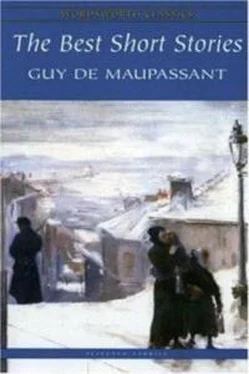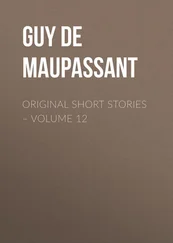Her pale face seemed to grow a little longer; her calm eyes, which always remained open, suddenly closed so quickly that they seemed shut forever. She slipped from her chair to the floor, and slowly, gently sank down as would a fallen garment.
I cried: "Help! help! Mademoiselle Pearl is ill."
Madame Chantal and her daughters rushed forward, and while they were looking for towels, water and vinegar, I grabbed my hat and ran away.
I walked away with rapid strides, my heart heavy, my mind full of remorse and regret. And yet sometimes I felt pleased; I felt as though I had done a praiseworthy and necessary act. I was asking myself: "Did I do wrong or right?" They had that shut up in their hearts, just as some people carry a bullet in a closed wound. Will they not be happier now? It was too late for their torture to begin over again and early enough for them to remember it with tenderness.
And perhaps some evening next spring, moved by a beam of moonlight falling through the branches on the grass at their feet, they will join and press their hands in memory of all this cruel and suppressed suffering; and, perhaps, also this short embrace may infuse in their veins a little of this thrill which they would not have known without it, and will give to those two dead souls, brought to life in a second, the rapid and divine sensation of this intoxication, of this madness which gives to lovers more happiness in an instant than other men can gather during a whole lifetime!
While apparently thinking of something else, Dr. Sorbier had been listening quietly to those amazing accounts of burglaries and daring deeds that might have been taken from the trial of Cartouche. "Assuredly," he exclaimed, "assuredly, I know of no viler fault nor any meaner action than to attack a girl's innocence, to corrupt her, to profit by a moment of unconscious weakness and of madness, when her heart is beating like that of a frightened fawn, and her pure lips seek those of her tempter; when she abandons herself without thinking of the irremediable stain, nor of her fall, nor of the morrow.
"The man who has brought this about slowly, viciously, who can tell with what science of evil, and who, in such a case, has not steadiness and self–restraint enough to quench that flame by some icy words, who has not sense enough for two, who cannot recover his self–possession and master the runaway brute within him, and who loses his head on the edge of the precipice over which she is going to fall, is as contemptible as any man who breaks open a lock, or as any rascal on the lookout for a house left defenceless and unprotected or for some easy and dishonest stroke of business, or as that thief whose various exploits you have just related to us.
"I, for my part, utterly refuse to absolve him, even when extenuating circumstances plead in his favor, even when he is carrying on a dangerous flirtation, in which a man tries in vain to keep his balance, not to exceed the limits of the game, any more than at lawn tennis; even when the parts are inverted and a man's adversary is some precocious, curious, seductive girl, who shows you immediately that she has nothing to learn and nothing to experience, except the last chapter of love, one of those girls from whom may fate always preserve our sons, and whom a psychological novel writer has christened 'The Semi–Virgins.'
"It is, of course, difficult and painful for that coarse and unfathomable vanity which is characteristic of every man, and which might be called 'malism', not to stir such a charming fire, difficult to act the Joseph and the fool, to turn away his eyes, and, as it were, to put wax into his ears, like the companions of Ulysses when they were attracted by the divine, seductive songs of the Sirens, difficult only to touch that pretty table covered with a perfectly new cloth, at which you are invited to take a seat before any one else, in such a suggestive voice, and are requested to quench your thirst and to taste that new wine, whose fresh and strange flavor you will never forget. But who would hesitate to exercise such self–restraint if, when he rapidly examines his conscience, in one of those instinctive returns to his sober self in which a man thinks clearly and recovers his head, he were to measure the gravity of his fault, consider it, think of its consequences, of the reprisals, of the uneasiness which he would always feel in the future, and which would destroy the repose and happiness of his life?
"You may guess that behind all these moral reflections, such as a graybeard like myself may indulge in, there is a story hidden, and, sad as it is, I am sure it will interest you on account of the strange heroism it shows."
He was silent for a few moments, as if to classify his recollections, and, with his elbows resting on the arms of his easy–chair and his eyes looking into space, he continued in the slow voice of a hospital professor who is explaining a case to his class of medical students, at a bedside:
"He was one of those men who, as our grandfathers used to say, never met with a cruel woman, the type of the adventurous knight who was always foraging, who had something of the scamp about him, but who despised danger and was bold even to rashness. He was ardent in the pursuit of pleasure, and had an irresistible charm about him, one of those men in whom we excuse the greatest excesses as the most natural things in the world. He had run through all his money at gambling and with pretty girls, and so became, as it were, a soldier of fortune. He amused himself whenever and however he could, and was at that time quartered at Versailles.
"I knew him to the very depths of his childlike heart, which was only too easily seen through and sounded, and I loved him as some old bachelor uncle loves a nephew who plays him tricks, but who knows how to coax him. He had made me his confidant rather than his adviser, kept me informed of his slightest pranks, though he always pretended to be speaking about one of his friends, and not about himself; and I must confess that his youthful impetuosity, his careless gaiety, and his amorous ardor sometimes distracted my thoughts and made me envy the handsome, vigorous young fellow who was so happy at being alive, that I had not the courage to check him, to show him the right road, and to call out to him: 'Take care!' as children do at blind man's buff.
"And one day, after one of those interminable cotillons, where the couples do not leave each other for hours, and can disappear together without anybody thinking of noticing them, the poor fellow at last discovered what love was, that real love which takes up its abode in the very centre of the heart and in the brain, and is proud of being there, and which rules like a sovereign and a tyrannous master, and he became desperately enamored of a pretty but badly brought up girl, who was as disquieting and wayward as she was pretty.
"She loved him, however, or rather she idolized him despotically, madly, with all her enraptured soul and all her being. Left to do as she pleased by imprudent and frivolous parents, suffering from neurosis, in consequence of the unwholesome friendships which she contracted at the convent school, instructed by what she saw and heard and knew was going on around her, in spite of her deceitful and artificial conduct, knowing that neither her father nor her mother, who were very proud of their race as well as avaricious, would ever agree to let her marry the man whom she had taken a liking to, that handsome fellow who had little besides vision, ideas and debts, and who belonged to the middle–class, she laid aside all scruples, thought of nothing but of becoming his, no matter what might be the cost.
"By degrees, the unfortunate man's strength gave way, his heart softened, and he allowed himself to be carried away by that current which buffeted him, surrounded him, and left him on the shore like a waif and a stray.
Читать дальше












